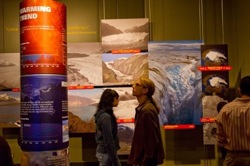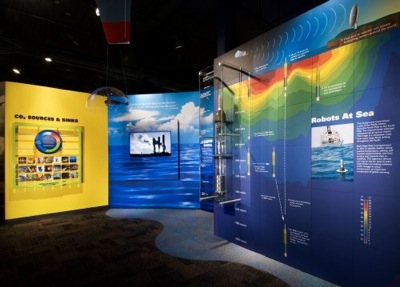SAN DIEGO — Scientists from 50 nations are gathered here this week for the annual meeting of the American Association for the Advancement of Science (AAAS). This year’s theme is “Bridging Science and Society”–not surprising as recent surveys reveal there’s a lot of bridge building to do.

During a two-day pre-conference for “informal educators” (science museums, aquariums, zoos, and the like) on “climate literacy,” speakers painted a mostly grim picture of Americans’ understanding of climate in particular and science in general. Jean Johnson of the nonpartisan research organization Public Agenda pointed to research in which, when asked to “name a fossil fuel,” only four in ten could. Similarly, 56% surveyed thought that nuclear power contributed to global warming. There is still considerable confusion between climate change and the much publicized ozone “hole.”
Speakers from Yale, George Mason University* and the Pew Research Center all highlighted the recent trend toward rejection of contemporary climate science, despite several decades of accumulated evidence that affirms human impacts on climate. Several speakers, including former IPCC climatologist Richard Somerville (Coordinating Lead Author in Working Group I, for the 2007 Fourth Assessment Report) laid the blame for this chiefly on what was characterized as a well-coordinated, well-financed campaign of disinformation, organized by industries opposed to regulation of carbon emissions.
Some noted other factors, such as topic “fatigue” (people tired of hearing about it) and the current dismal state of the economy, which has shuffled personal priorities. Layered on all of that, “We live in an age of skepticism,” said Johnson of Public Agenda, in which trust in traditional institutions like government (and the media) is flagging. She pointed to the need for “credible neutral explainers” to act as translators between working scientists and the public. Anthony Leiserowitz of Yale, co-creator of the Six Americas project, noted that despite growing skepticism, there is still strong public support for climate and environmental education.

Frank Niepold, education coordinator for NOAA’s Climate Program Office, pointed to what he calls the “solutions barrier.” He noted that while the likely effects of climate change are often discussed in K-12 classrooms, there’s a lack of attention to potential solutions. Other speakers said climate impacts and solutions should be more closely linked to issues that are consistently rated as high priorities among households, such as energy independence and public health.
*Climate Watch partnered with Yale and George Mason researchers to create our climate survey, “A Matter of Degree,” which is featured on Facebook and on the Climate Watch website.
4 thoughts on “Bridging the Science Gap”
Comments are closed.

I’m thinking a ballot initiative requiring all government retirement funds be invested in carbon credits would be a good thing.
It would make more of an impact on the recalcitrant climate deniers if the only proponents were to invest their whole future in this settled science.
How about you Craig? How deep is your
faithbelief?Several speakers, including former IPCC climatologist Richard Somerville laid the blame for this chiefly on what was characterized as a well-coordinated, well-financed campaign of disinformation, organized by industries opposed to regulation of carbon emissions.
How does one become a climatologist? Is there a climatology school?
Never mind. We both know the answer.
Why don’t they tell the kiddies that they should have to give up soccer and stuff cause mommy can’t afford the gas to get them there and she shouldn’t be driving to Disney either – they will love that part
maybe if they weren’t such a pack of outright liars people might believe them but they are and everybody has figured out their just trying to make a buck off them – make that more than one
I like the retirement idea – your not allowed to say anything unless your fully vested LOL